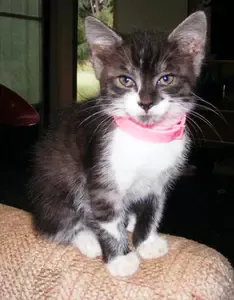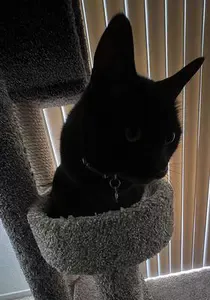My cat poops and pees in the house
by Karl
(Stark )
I have two cats. They grew up together and they are both 14 years old. One is a black Angora and the other a Tabby. The black one does not groom itself well and the Tabby is always trying to groom it. The black one also does not cover up when he uses the Litter box and the Tabby is always cleaning up after him.
Now the black one has started to pee and poop in corners or behind furniture of the house sporadically. There seems to be no apparent reason for this behavior. They both eat the same food. The food is dry food and we get the best food recommended by the vet.
We have two large litter boxes for the two of them and we clean them twice a day, in the morning and in the evening and if we happen to see anything in the litter box we clean it out right away. We have been using the same litter for years.
So no changes in placement of the boxes, litter, litter cleanliness, food etc. To me it seems that the black cat is just getting more lazy as he gets older, less grooming and less litter box hygiene. I was thinking that maybe he forgets where the box is but he usually poops close by the litter box.
I am getting tired of this and I am considering putting him to sleep but I think the Tabby would probably miss him and they both seem to be pretty healthy according to the Vet. I would appreciate any input. Thank you.
My Thoughts:
When you add up the lack of self grooming, not covering up feces in the box, and now occasionally not using the box at all, I can see how you would conclude laziness as the possible cause.
It's common, however, to group what we view to be related items together, even when they're not related. It's also common to assign human qualities to our cats, even when they don't apply. Let me give you a summary and some questions to help clarify the issue, and then you can read more detail below as I think out loud.
The first thing I'd do is start documenting each incident, and look for common patterns. What's going on at the time this occurs? Is there any change in your cat's routine? Does he appear to be in any pain, emotional distress, or exhibit any other signs of illness?
Also, is this marking behavior? Or, is it inappropriate elimination/litter box aversion?
Has your cat been checked by your vet since he started this behavior? Was he checked immediately after an incident to see if your vet could find a cause? Does your vet suspect marking or inappropriate elimination? Bladder or bowel problems? Does your vet have any recommendations as to what to try? Have you discussed using Feliway with your vet?
There are so many factors and so many dynamics that can play out with litter box problems, that it's sometimes a real detective job to figure out what's wrong. This is especially true in multi-cat or multi-pet households.
I've heard everything from impacted anal glands, to arthritis, to infections, to stray cats outside the house, to turf wars, to being punished with a water bottle as being the cause.
I own something like 15 books on cats now, and in some of them there are stories on behavior that are hard to believe, but they're documented by professionals. An indoor cat, who never goes in the front yard,
We can't always fully understand why some cats exhibit certain behaviors, but keeping a journal can help to gather the facts surrounding each incident.
Not covering up...
Not covering up feces in the litter box is not necessarily related to poor hygiene, and it's not actually laziness either. Instead, it is often said to be a statement that "I'm top cat around here." In other words, it's actually a territorial marking behavior. Teddie has done this from time to time, even though she was clearly not the top cat in the house at the time.
Marking behavior vs. inappropriate elimination...
Speaking of marking behavior, some cats may use feces to mark around the house or yard (although urine is more common). With respect to urine, marking with urine is usually done on a vertical surface, but actual urination is done on a horizontal surface. If you notice any urine on the wall, your cat may be marking.
Marking behavior can sometimes start without warning in a cat who previously did not express this behavior. This could be due to a perceived threat (e.g. outdoor cats coming by the house, a change in the household or your cat's routine, or aggression from another pet or human in the house). It may also be due to a change in the hierarchy of animals in the house. For example, the previously dominant cat becomes ill, and therefore now is the weaker cat.
Not self grooming...
When a cat fails to self groom at a young age, it may be due to being removed from the mother's care too early, or some other traumatic experience. Cats that suffer from generalized anxiety disorder (whatever the cause), may also exhibit a failure to self groom. Sometimes you can jump start regular self grooming activity by grooming your cat often, or bathing.
Interestingly (perhaps), anxiety disorder can also manifest as litter box problems, in cats of any age.
Older cats who fail to self groom may be doing so due to weakness, flexibility problems or pain (say, from arthritis), or some other ailment. Congestive heart failure for example, can limit your cat's movement.
The problem here is that since your cat has always had a grooming problem, there's no way to know if he would have developed this problem later in life. So, we can't reliably use it as an indicator that there is a newly developed problem.
Is it possible that your cat has always had anxiety disorder, which manifested as a failure to groom, and now also manifests as inappropriate elimination? Or, is your cat actually exhibiting marking behavior, and not inappropriate elimination?
Older cats...
As cats age, they may have less control over their bowels and bladder. They may also become ill and sometimes the only sign of this is a litter box problem. At 14 years old, any cat that exhibits these problems, or any change in behavior, should be checked out by a vet with specific attention to the inappropriate elimination or behavior change.
Fear response...
If your cat is fearful of something, or is startled by loud noises, he may relieve himself. This may be more likely as your cat ages and the plumbing doesn't work as well as it used to.
I hope that helps some. Please let us know what you discover and how he progresses.
-Kurt
Comments for My cat poops and pees in the house
|
||
|
||

